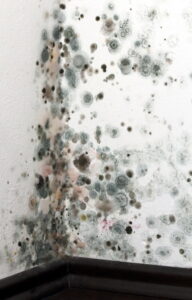As a leading home restoration company specializing in mold remediation in Orange County, we understand how crucial it is to keep your home mold-free. Mold can pose serious health risks and cause extensive damage to your property if left untreated.
Today, we’ll discuss how mold gets into your home, common areas where it starts, and offer prevention tips to help keep mold at bay. If mold does take hold in your home, rely on our professional mold remediation services to handle the situation safely and effectively.
How Mold Gets Started in a Home
Mold thrives in damp, humid environments, making it important to control moisture levels in your home. Here’s how mold can get started:
Water Leaks
Leaky pipes, damaged roofs, and cracks in windows can create the perfect breeding ground for mold. Even a small leak can lead to moisture buildup over time, encouraging mold growth.
Poor Ventilation
Areas with poor ventilation, such as bathrooms, kitchens, and crawl spaces, can trap moisture and create a perfect environment for mold to grow.
Condensation
Condensation forms on surfaces when warm, moist air meets a cold surface. This can happen on windows, pipes, and other areas, leading to mold growth.
Flooding or Water Damage
Flooding or significant water damage can introduce excessive moisture into your home, allowing mold to grow quickly if not properly addressed. This is one of the major dangers of water damage in a home.
High Humidity Levels
High humidity levels (above 60%) can promote mold growth, particularly in parts of a house that are not well-ventilated.
Where Mold Commonly Gets Started
Mold can grow anywhere in your home, but certain areas are more prone to infestation:
Bathrooms
Bathrooms are often damp, making them prime locations for mold, particularly around showers, bathtubs, and under sinks.
Crawl Spaces
The area under a house is often prone to high humidity and can be affected by groundwater or seepage, making it susceptible to mold growth.
Attics
Improperly ventilated attics can trap moisture, leading to mold growth on wood, insulation, and stored items.
Kitchens
Moisture from cooking and leaks in sinks or dishwashers can create an environment for mold growth.
Prevention Tips to Keep Mold at Bay
Preventing mold is key to maintaining a healthy home environment. Here are some tips to help you keep mold from starting:
Control Moisture
Keep humidity levels below 60% and ensure proper ventilation in bathrooms, kitchens, and other moisture-prone areas. Whole-house dehumidifiers are the best way to achieve this.
Fix Leaks Promptly
Repair any leaks in your home as soon as you discover them to prevent moisture buildup.
Use Exhaust Fans
Install exhaust fans in bathrooms and kitchens to help remove moisture and improve ventilation.
Monitor Humidity Levels
Use a hygrometer to monitor humidity levels in your home and take action if they are too high.
Clean and Dry
Regularly clean and dry areas prone to moisture, such as showers, sinks, and appliances.
When to Rely on Professional Mold Remediation
If you suspect mold growth in your home, it’s important not to try to remove it yourself. Mold removal can be hazardous, and improper handling can spread mold spores and worsen the problem. Instead, rely on the professional mold remediation experts at Jarvis Restoration. Our team has the expertise, equipment, and safety protocols to handle mold safely and effectively.
For comprehensive home restoration services you can rely on, contact Jarvis Restoration today!

